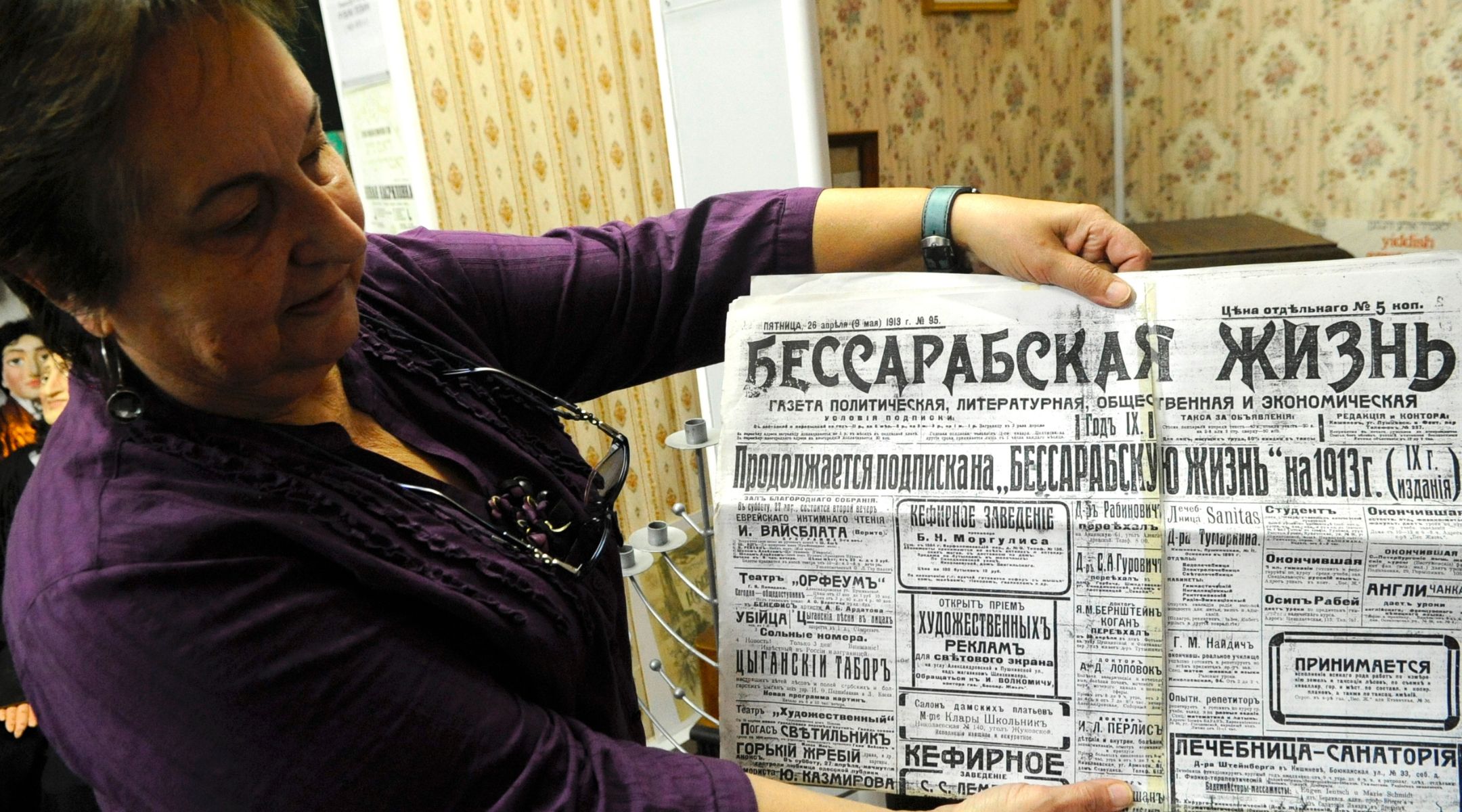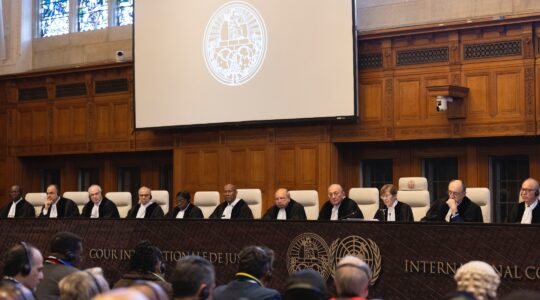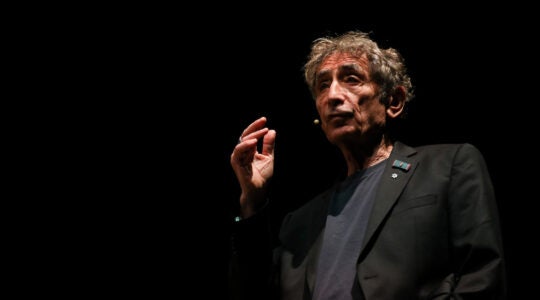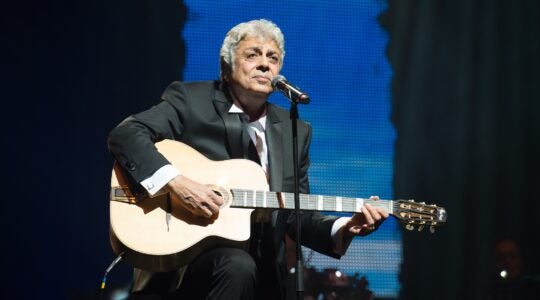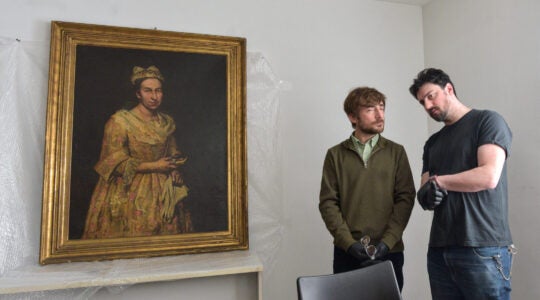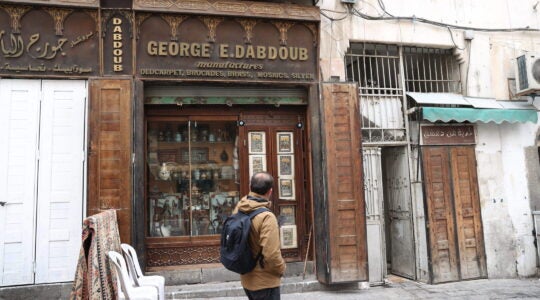CHIȘINĂU, Moldova — For most of her life, Peruvian-born Yvette Merzbacher wondered where her four paternal great-grandparents were buried. All she knew was that her grandparents came from Bessarabia, and that her grandmother, Liza Bronstein, had emigrated to Lima, Peru, in 1932 with her two older sons, following her husband, Yoil, who had moved there five years earlier.
Researching the Peruvian National Archives in 2010 led to the family’s place of origin: Edineț — a town in what is now northern Moldova. It had been known as Yedinitz in the Yiddish of the Jews who once lived there, and now are present only in its cemetery.
Merzbacher’s curiosity led her to establish LivingStones, a Swiss-based nonprofit that’s leading efforts to preserve Jewish burial grounds throughout Moldova and protect them from antisemitic vandalism — including the one in Edineț.
“In July 2021, I started a project to photograph every surviving tombstone in that cemetery, and two years later, I found it,” said Merzbacher, 61, said of the final resting place of her great-grandmother Rachel Koifman, who died in 1921. “For me, recovering a piece of my family was breathtaking. When I finally put a stone on her grave, it was one of the happiest moments of my life.”
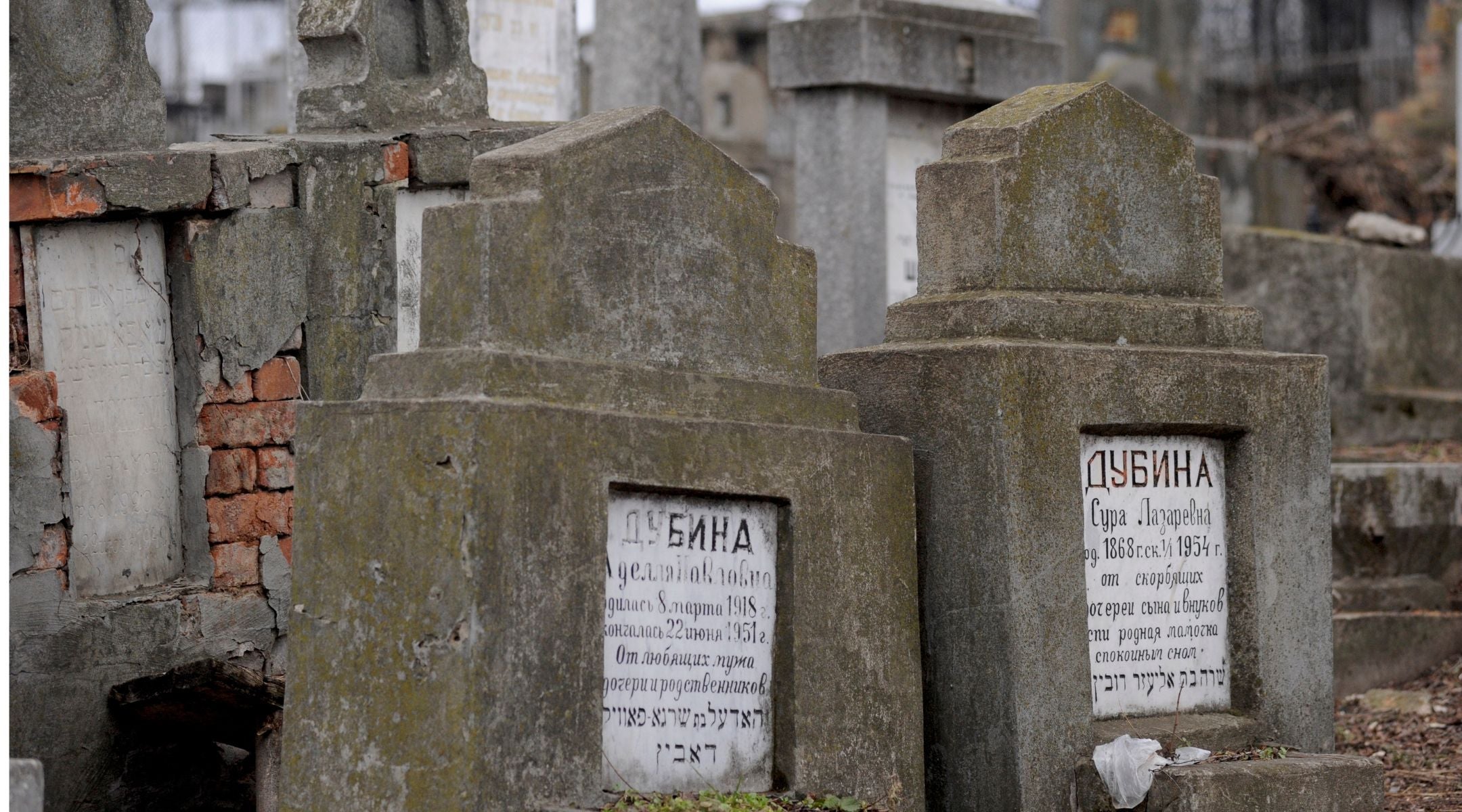
Gravestones in various states of disrepair at the Jewish cemetery in Chișinău, Moldova. (Photo by Larry Luxner)
For the past five years, LivingStones has also offered informal Jewish education through its project Likrat Moldova. This project trains teenagers to fight antisemitism and dispel stereotypes when speaking about Jews in high schools throughout Moldova.
Such programs are badly needed, said Rabbi Menachem Margolin, chairman of the European Jewish Association.
According to a 2024 poll of nearly 1,000 Moldovans published by EJA and the Brussels-based Action and Protection League, 48% of respondents said they didn’t like Jews, with 13% saying they “really dislike” them.
“Despite the government’s efforts, deep-rooted antisemitism persists in Moldova,” Margolin said recently. “It will take much more than the adoption of IHRA [International Holocaust Remembrance Alliance] definitions and changes in the legal code to affect existing antisemitic attitudes in the country. The change in school classrooms is an urgent matter, and it if doesn’t happen, the next generation will perpetuate and carry the virus of antisemitism with them.”
Indeed, when it comes to antisemitism, the former Soviet republic of Moldova has a dismal track record.
Its capital city, Kishinev — now called Chișinău — is synonymous with a 1903 pogrom sparked by blood libel that killed 49 Jews, injured over 600 and sparked mass emigration from the Russian Empire to North America, changing the course of modern Jewish history.
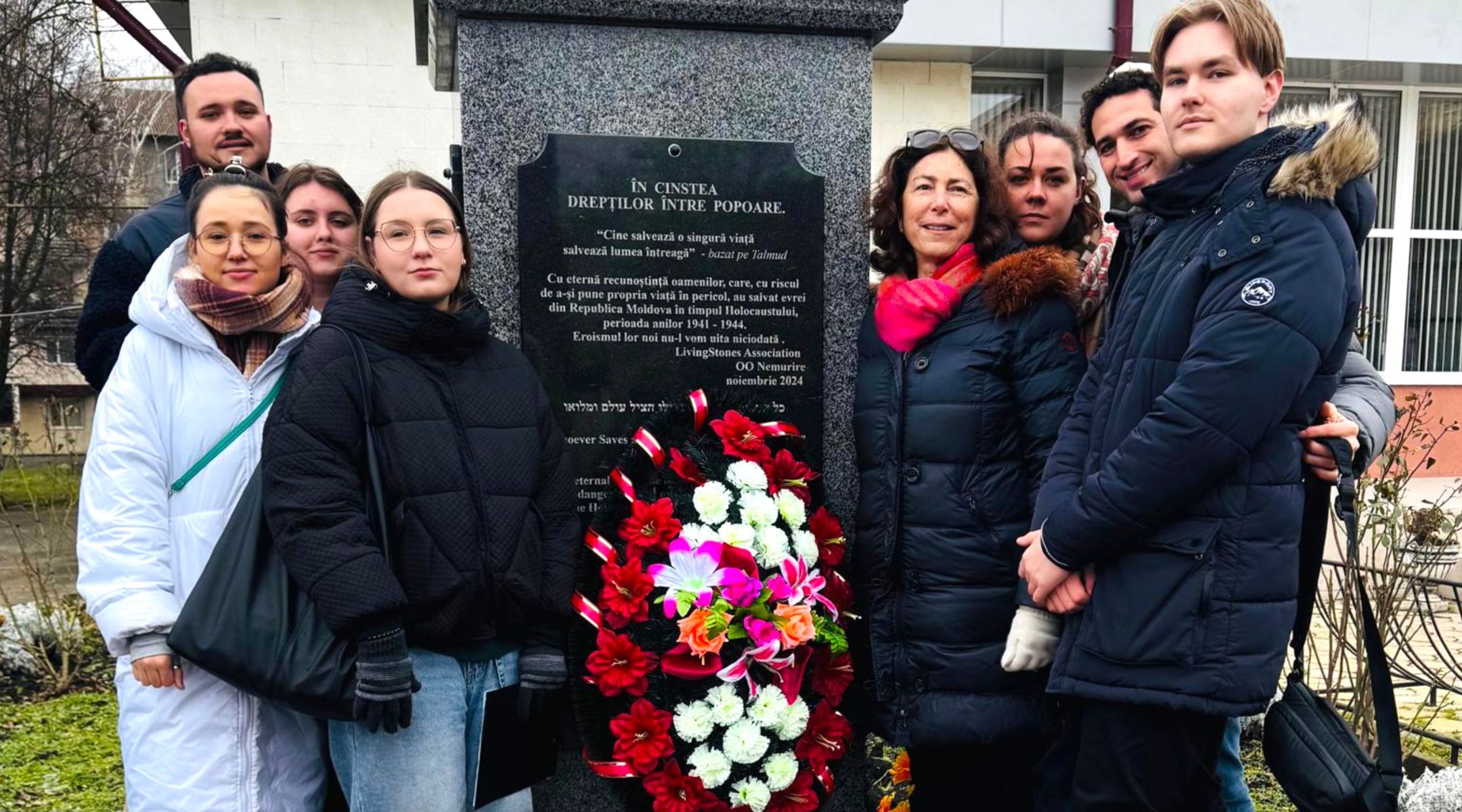
Yvette Merzbacher (4th from right), founder of nonprofit group LivingStones, unveils a monument to honor the 79 “Righteous Among the Nations” who saved Jews from Nazis and their collaborators during the Holocaust. The Jan. 26, 2025, ceremony in Cupcini, Moldova, coincided with the 80th anniversary of the liberation of Auschwitz. (Photo courtesy of LivingStones)
During the Holocaust, about 60,000 Jews were killed in the region of Bessarabia, which includes parts of Ukraine and Moldova. Even today, politicians routinely downplay the Shoah and glorify Nazi collaborators, while cemeteries are often desecrated — most recently on the night of June 3, when vandals spray-painted swastikas on 37 tombstones in the Jewish cemetery of Chișinău.
“The escalation in the Middle East is accompanied by a wave of antisemitic incidents across Europe, underscoring the urgent need for increased vigilance to protect Jewish communities on the continent,” Moldovan Chief Rabbi Pinchas Zaltzman said in a statement referring to Israel’s war in Gaza and its conflict with Iran. “Unfortunately, Moldova is not immune to this trend.”
Yet Israel-Moldova ties are friendly, and this past April — 30 years after establishing bilateral relations — Israel finally inaugurated an embassy in Chișinău.
In late July, Israeli Foreign Minister Gideon Sa’ar, whose paternal grandfather was born in Moldova, visited the country and met with top government and Jewish officials. Among the items on their agenda: commemorating victims of the Kishinev Ghetto and arranging for the passage of haredi Orthodox Jews traveling to Uman — a holy site in neighboring Ukraine — via Moldova ahead of Rosh Hashanah.
“We don’t have embassies everywhere, but we decided to open one here because Israel has very strong links and a longstanding friendship with Moldova,” Ambassador Yoram Elron said in an interview from his temporary office in a downtown shopping mall.
Elron presented his credentials to President Maia Sandu on Friday, making his presence in the country official. “There’s a vested interest on both sides to cultivate relations, a confluence of interests — political, economic, strategic and cultural — and of course the Jewish community serves as a human bridge between our two countries,” he said.
That community, which numbered 98,000 at its peak in 1970, had already fallen to about 65,000 by the time the USSR collapsed in 1991 and Moldova declared its independence. Today, the country — one of Europe’s poorest — is home to some 5,000 Jews, or between 10,000 and 12,000 as defined by the more lenient standards of Israel’s right of return.
Aliona Grossu heads the Jewish Community of the Republic of Moldova, known as JCRM. She said about a third of Moldova’s Jews live in Chișinău, with smaller communities in Bălți, Orhei, Soroca, Bender, Tiraspol, Grigoriopol, Dubăsari and Rîbnița.
At the moment, Moldova’s biggest concern is the ongoing war between neighboring Ukraine and much bigger Russia — a conflict that’s been raging since February 2022. For Moldova, one immediate consequence was the sudden arrival of 800,000 to 1 million refugees, about 100,000 of whom have opted to stay here permanently.
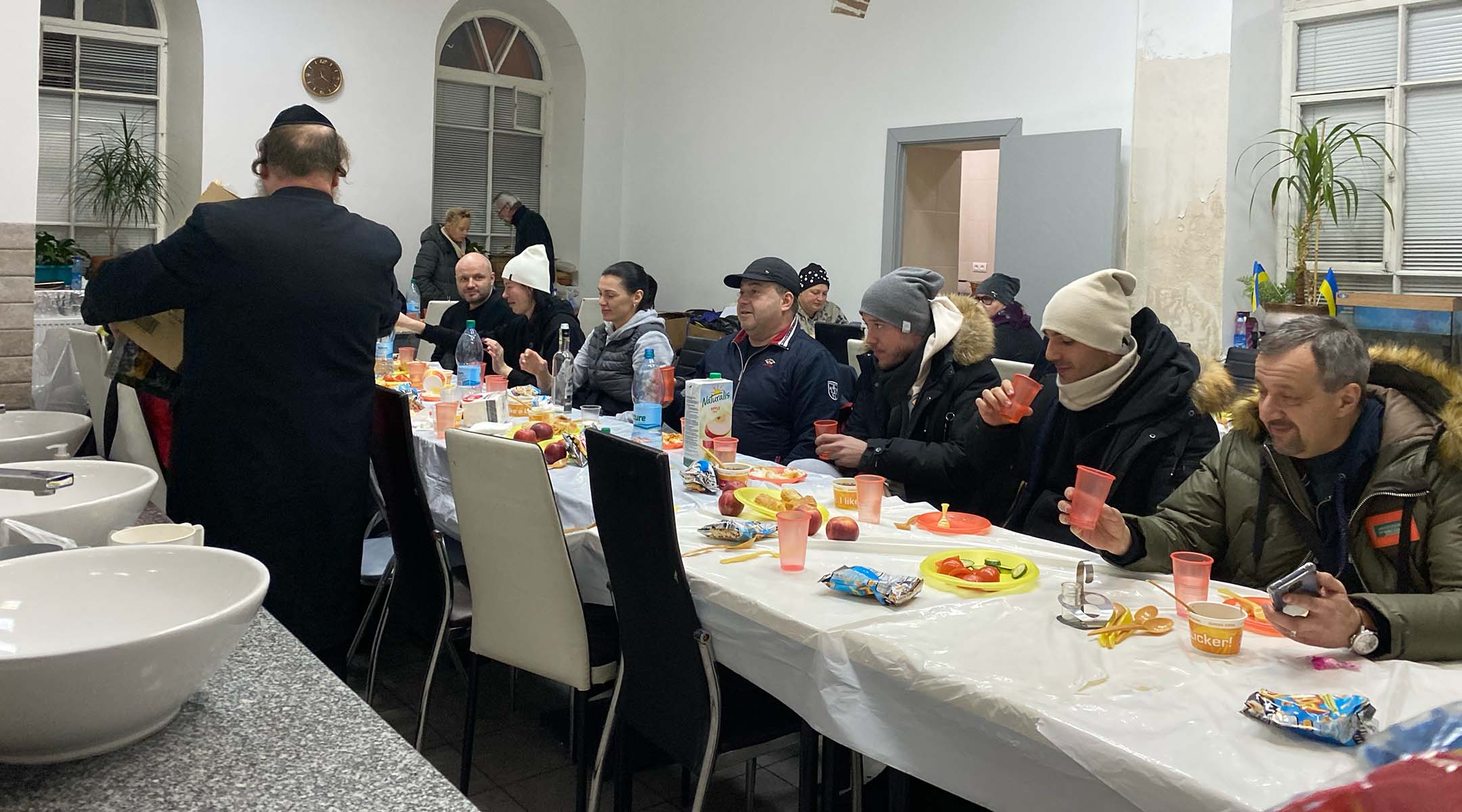
Ukrainian refugees enjoy a meal at the Agudath Israel synagogue in Chisinau, Moldova, March 3, 2022. (Jacob Judah)
“This has affected us directly. From all points of view — energy, inflation, security — life here has become very tough,” Grossu said, estimating that since the war, JCRM has assisted more than 15,000 refugees.
“We don’t discriminate or ask about their religion, but probably half of them are Jewish,” she said. “In the beginning, it was more about rescuing them and offering emergency humanitarian assistance like food, shelter and medication. Now it’s evolved into relocation and repatriation to Israel for those who want, and to other countries.”
Mark Dovev, head of the Israeli government authority Nativ’s office in Ukraine, said that since the fighting began two and a half years ago, he and his Chișinău-based counterpart, Marina Anukov, have helped thousands of Ukrainian and Russian Jews make aliyah via Moldova.
“Our office has operated for 30 years here in Moldova,” he said. “Before the embassy opened, we were the only Israeli government office in the country.”
Israel today is home to roughly 75,000 Moldovan-born Jews including lawmaker and former Defense Minister Avigdor Lieberman. Also of Moldovan origin: Tel Aviv’s first mayor, Meir Dizengoff, and Shmuel Cohen, composer of the Israeli national anthem “Hatikvah.”
In November 2024, Moldova’s Western-leaning president, Maia Sandu, won reelection and vowed to pursue membership in the 27-member European Union. Even so, pro-EU and anti-EU factions continue to divide the vulnerable country, which shares a 759-mile border with Ukraine. Its future could be decided by parliamentary elections set for later this month.
Complicating the situation is Transnistria, a breakaway region of Moldova squeezed between the Dniester River to the west and Ukraine to the east. Some 465,000 people, including 2,000 Jews, live there — most of them in Tiraspol, capital of this self-proclaimed entity heavily influenced by Moscow.
“There was a fear that Russia would try to invade Moldova. I think that [with Sandu’s reelection] this train of thought has calmed down,” said Israel’s Elron, noting that parts of missiles fired by Russian forces have occasionally fallen inside Moldovan territory. “That’s why it’s so important for Moldova to join the EU.”
Meanwhile, Moldova’s Jews are aging, with many people leaving and few babies being born. The country currently has two functioning Jewish schools and seven synagogues: four in Chișinău — Agudat Israel, Bet Yosef, Chabad-Lubavitch and Lemnaria — and one each in Orhei, Tiraspol and Soroca.
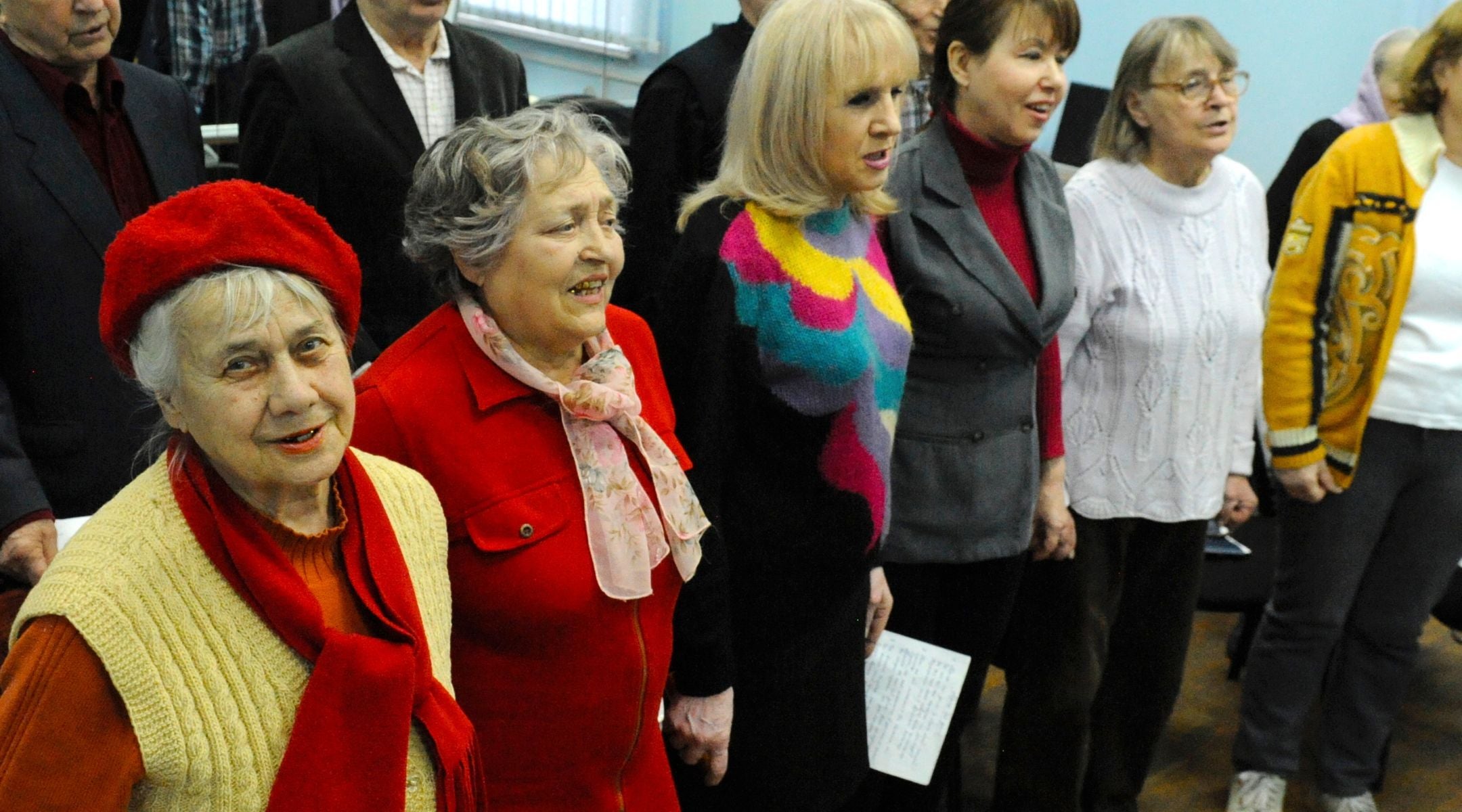
Elderly Moldovan Jews sing Yiddish songs during a cultural program at the Kishinev Jacobs Jewish Campus in Chișinău. (Photo by Larry Luxner)
The American Jewish Joint Distribution Committee, active in Moldova since 1921, says it is “delivering lifesaving aid” in the form of food, medicine and homecare programs to more than 2,000 seniors and over 200 children and families through Hesed social service centers.
“Many Moldovan Jews were thrown into poverty with the collapse of the Soviet Union. And today, with rising inflation and meager pensions, a significant portion of Moldova’s Jews struggle to survive on as little as $2 a day,” according to a JDC fact sheet. In 2024, more than 1,400 volunteers participated in JDC-sponsored programs in Chișinău, Balti and Tiraspol.
Other ongoing JDC programs in Moldova include Active Jewish Teens — a youth initiative that spans 63 cities across the former Soviet Union — and JoinTech, an effort that alleviates loneliness by connecting elderly and isolated Jews to family, friends and the community via specially designed smartphones. Since its launch, JoinTech now reaches more than 1,000 clients in Chișinău, Beltsy, Tiraspol and Rîbnița.
In recent years, Moldova has become a popular destination for foreign Jewish travelers seeking their Bessarabian roots. They come not only from Israel and Western Europe but also from the United States, Canada and even Latin America. Many, like Merzbacher, have family ties to the territory: At the time of the 1903 pogrom, 46% of the 110,000 inhabitants of Chișinău were Jews.
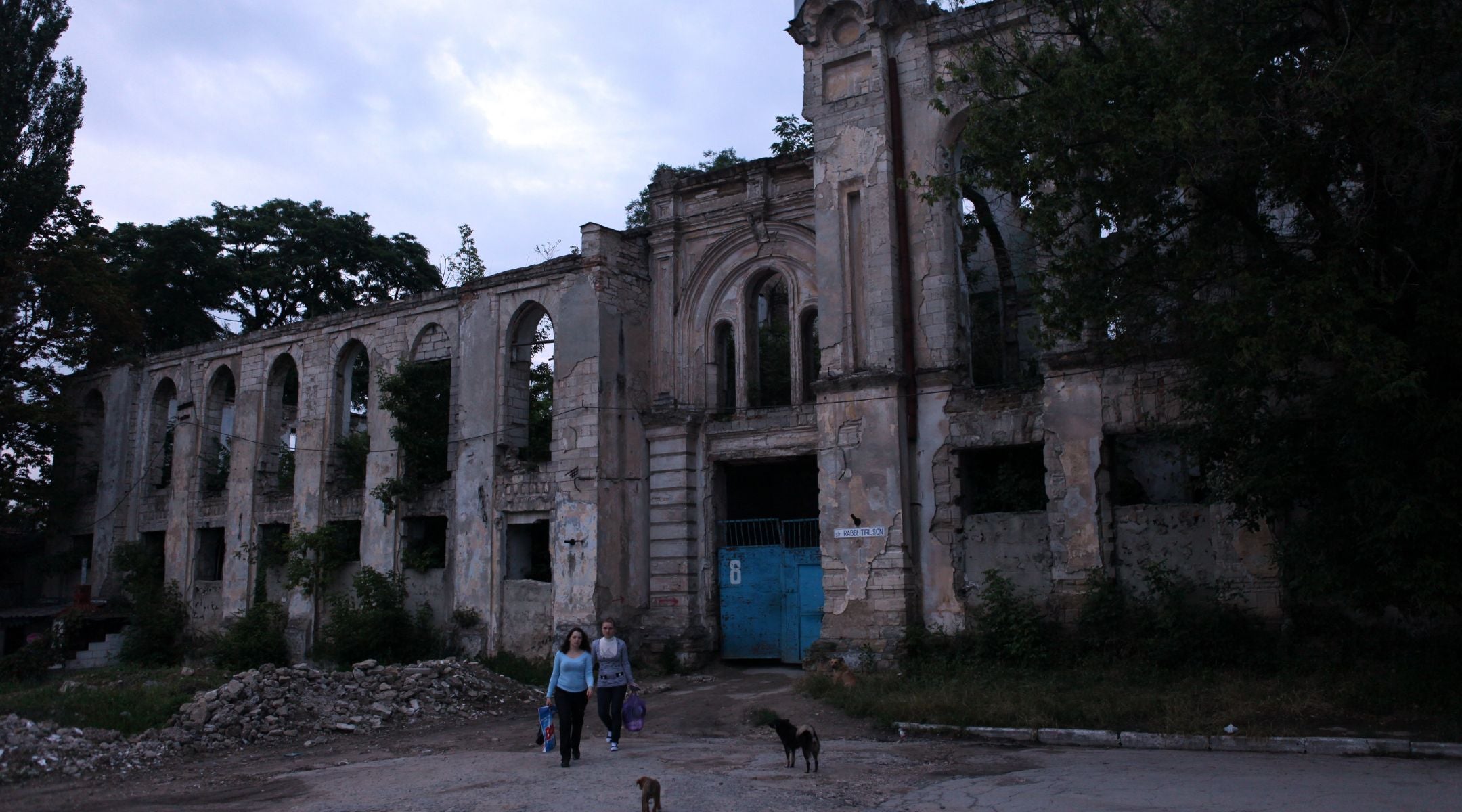
An old dilapidated synagogue that was not destroyed under the Soviet regime stands in ruins in Chisinau, Moldova, June 26, 2010. (Photo by Kitra Cahana/Getty Images)
Since 2017, Merzbacher’s LivingStones has installed three Holocaust memorials in villages across northern Moldova, including one in Zaicani, the hamlet where her grandfather Yoil was born. In addition — after recovering information that had long receded from public view — it erected a plaque on an obelisk erected by Jews as a memorial in the 1950s that had been abandoned in the middle of a field. All include QR codes for self-learning and guiding.
Over a four-year period, she and her team in the United States and Israel mapped and digitized all surviving 2,872 graves at the Jewish cemetery in Edineț. The graves had already been photographed in 2021 and translated from Hebrew and Yiddish into English in 2023; the idea is to help descendants in the United States, Israel, Switzerland and elsewhere find lost relatives.
This past January, marking the 80th anniversary of the liberation of Auschwitz, the group sponsored and inaugurated a new memorial in Cupcini, along with a local charity, Nemurire, to honor Moldova’s 79 “Righteous Among the Nations,” or non-Jews who sought to protect their Jewish neighbors during the Holocaust.
“This monument is a testament to the power of standing up for what is right, and to honor their memory and carry forward their legacy of kindness and courage,” Merzbacher said.
Grosso said that while Jews and Israelis are not being threatened in the streets of Chișinău — as has become the case since Oct. 7 in some other European countries — a more insidious type of antisemitism seems to simmer just below the surface.
“We are mostly concerned with the lack of proper investigation of antisemitic incidents, Holocaust denial or distortion or glorification of Nazi perpetrators,” she said. “Unfortunately, these cases — even the ones we’re monitoring — never make it to the court.”
The latest incident involves a 12th-grade history textbook recently approved by Moldova’s Ministry of Education. Grossu said it minimizes and distorts the role of Romania’s Antonescu regime during the Holocaust.
“The textbook conceals or distorts fundamental historical facts regarding the genocide of Jews and Roma; portrays in a positive light the dictatorial and criminal regime of Marshal Ion Antonescu and replaces a critical analysis of this regime with an apologetic, dangerous approach, incompatible with democratic values and human rights education,” JCRM said in a statement.
The community called upon Education Minister Dan Perciun to immediately withdraw the book from use until it’s fully revised, and to initiate a public debate with participation from historians, educators, Holocaust survivors and civil society.
“In the absence of these measures, we reserve the right to challenge the ministry’s decision in court,” Grosso said. “We cannot educate future generations in the spirit of truth and tolerance if attempts are made to falsify the past.”
JTA has documented Jewish history in real-time for over a century. Keep our journalism strong by joining us in supporting independent, award-winning reporting.
